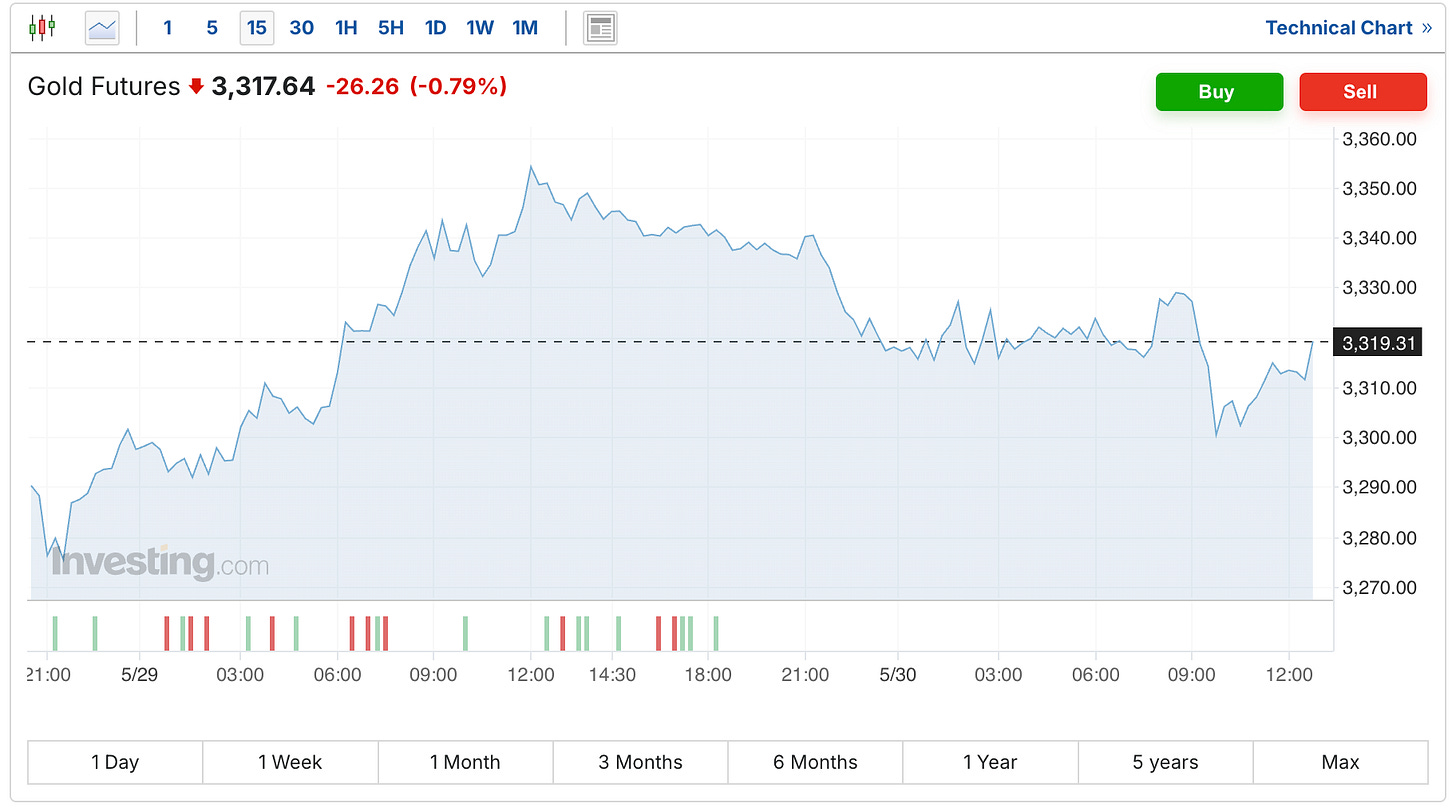Elon Musk's Departure Tells Gold & Treasury Investors All They Need To Know
The gold and silver futures were down on Friday afternoon as the week draws to a close.
Gold is currently $26 lower at $3,317.
While silver is down 43 cents to $32.99.
However the focus this week remains on the Big Beautiful Bill, which continues to get a less than stellar response.
Earlier this week we noted how the Wall Street Journal threw in the towel on any hopes for the US Treasury ever developing fiscal responsibility. And now you can add another high-profile figure who’s given up on trying to rehab the spending habits of the US government.
Yesterday I mentioned how Elon Musk had resigned from the Doge board, a few days after saying that BBB increases the budget deficit, and undermines the work that DOGE has already done (although apparently as a government advisor his term is allowed to last up to 130 days, but Trump says that he will stay on in some capacity).
There was also a press conference today in case you care to hear what they said.
Although I think the bigger point still stands.
Because whether the primary reason for Musk's resignation was the expiration of the time limit, or directly because of his frustration with how the Big Beautiful Bill basically ignored everything he found (my guess is that it's probably a mix of both), his comments were still made.
And even more important than Musk’s words, was the overall significance of what they implied.
Because here we are in 2025, where now gold and silver investors are not talking about what might happen one day, but we're already seeing a shift towards gold as collateral. There's also growing concern about dysfunction in the Treasury market, while we're also in the middle of a trade war that has alienated several of our largest creditors.
Yet even when someone like Elon Musk comes in on a high-profile effort to cut out fraud, and find some rather stunning examples, he's now leaving, and saying that when it came down to what was actually trying to get passed, it was basically the same old story that it's always been.
We've seen Ron Paul try his best, and while he had a magnificent impact on many of the American citizens (including myself), he was not able to put a dent in the US debt monster. And now more than a decade later, Musk has also been unsuccessful.
Which is not a criticism of Musk, but rather an assessment of how if even at this point, the government still can’t be bothered to account for $5 trillion of yearly unauthorized spending, is it really realistic to think that the Washington establishment is ever going to be able to stop until a crisis or restructure is forced by the markets?
Rather than trying to end the fraud, the government is going to court to try to block anyone from doing that.
The last three years of activity in the gold markets have begun a change that I personally don’t see getting reversed. If central banks thought it was a good idea to buy more gold and fewer treasuries three years ago, what are they supposed to think now?
Whether it's official policy or not, what message do Musk's comments send to US creditors?
What message are our lenders, investors, other governments and central banks supposed to take away from that?
And what actually is the underlying investment thesis that longer-term US treasuries offer at this point?
If someone wants to make the argument that this will be a longer and more gradual process than others are expecting, fair enough. Yet Musk's comments represent another massive nail in a coffin, that was already hammered solidly shut even before his statement.
Which is why the gold price has been rising. And that's also why there's an incredibly high probability that 10 years from now, holding gold will have outperformed cash or longer-term US debt.
The latest PCE inflation data was released on Friday morning, and came in lower than expected at 2.1% (core PCE was 2.5%).
However, remember that Jerome Powell recently warned about how ‘supply shocks and the associated price increases may become more frequent in the years ahead.’
U.S. Federal Reserve officials feel they need to reconsider the key elements around both jobs and inflation in their current approach to monetary policy, given the inflation experience of the last few years and the possibility that supply shocks and the associated price increases may become more frequent in the years ahead, Fed chair Jerome Powell said Thursday.
"We may be entering a period of more frequent, and potentially more persistent, supply shocks—a difficult challenge for the economy and for central banks,"
The CFO of Walmart also warned that price increases are going to be unavoidable due to the tariffs.
In the clip the host asks him if he would expect the price increases to be in the ‘double digits,’ and Walmart’s CFO responded, ‘if you’ve got a 30% tariff on something, you’re likely going to see double digit (price increases).’
So just a few things to keep in mind as you consider that government PCE inflation data.
But with that said, I hope this leaves you set and ready for a wonderful weekend, where you can relax and just appreciate how all of your research and effort are now paying dividends. And I’ll look forward to checking back in with you on Monday.
Sincerely,
Chris Marcus






